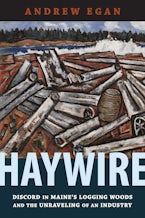
Haywire
Discord in Maine's Logging Woods and the Unraveling of an Industry
Published by: University of Massachusetts Press
216 Pages, 6.00 x 9.00 x 0.30 in, 4 illus.
Other Retailers:

by Andrew Egan
Published by: University of Massachusetts Press
216 Pages, 6.00 x 9.00 x 0.30 in, 4 illus.
Other Retailers:
Logging in the northern forest has been romanticized, with images of log drives, plaid shirts, and bunkhouses in wide circulation. Increasingly dismissed as a quaint, rural pastime, logging remains one of the most dangerous jobs in the United States, with loggers occupying a precarious position amid unstable markets, expanding global competition, and growing labor discord. Examining a time of transition and decline in Maine’s forest economy, Andrew Egan traces pathways for understanding the challenges that have faced Maine’s logging community and, by extension, the state’s forestry sector, from the postwar period through today.
Seeking greater profits, logging companies turned their crews loose at midcentury, creating a workforce of independent contractors who were forced to purchase expensive equipment and compete for contracts with the mills. Drawing on his own experience with the region’s forest products industry, interviews with Maine loggers, media coverage, and court documents, Egan follows the troubled recent history of the industry and its battle for survival.
ANDREW EGAN is professor of forest resources at Abraham Baldwin Agricultural College and author of Adirondack Hard Times: Evolution of a Rich Man’s Paradise.
“Haywire documents the history of the logging occupation in the Northeast, especially the tensions between workers and employers and major industries. There is almost no systematic and thorough formal literature on these issues.”—Lloyd C. Irland, author of Wildlands and Woodlots: The Story of New England’s Forests
“Egan studies a ‘time of transition’ in the Maine forest and how this transition—largely to mechanized logging and then the collapse of the pulp and paper industry—has impacted woods workers. Seeking to understand these challenges through the eyes of the loggers themselves, Egan offers a good sense of the on-the-ground reality.”—Richard W. Judd, author of Finding Thoreau: The Meaning of Nature in the Making of an Environmental Icon
"This book does a good job of identifying problems. It is a wakeup call that asks us to recognize and deal with some very serious realities . . ."—The Forestry Source
This website uses cookies so that we can provide you with the best user experience possible. Cookie information is stored in your browser and performs functions such as recognising you when you return to our website and helping our team to understand which sections of the website you find most interesting and useful.
Strictly Necessary Cookie should be enabled at all times so that we can save your preferences for cookie settings.
If you disable this cookie, we will not be able to save your preferences. This means that every time you visit this website you will need to enable or disable cookies again.
